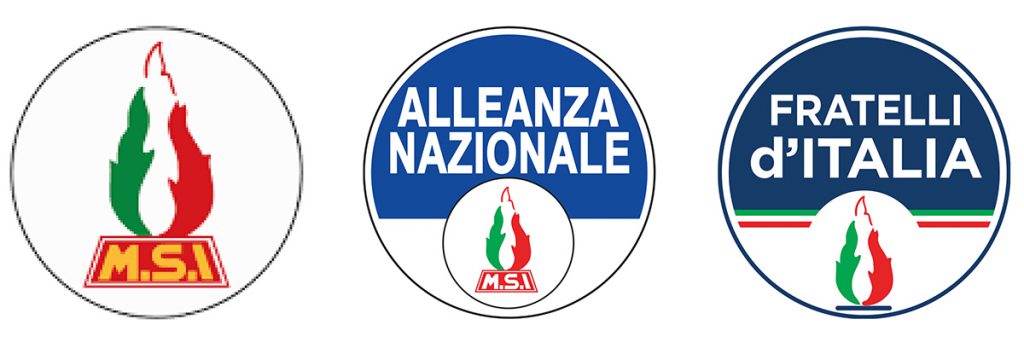Labelling populist far right parties as fascist is misleading, write Leonardo Puleo and Gianluca Piccolino. Vague accusations of fascism gloss over the genuine threats the radical right poses to democracy
Plenty of myths flutter around populism and the far right. This Loop series on populism has already demystified some of the most recurrent sins. Yet, conceptual confusion can also arise from the intertwining and layering of historical experiences, individual histories, and political ideas.
One such myth is the conflation of the radical populist right with fascism. In recent years, leaders from Bolsonaro to Trump have had charges of fascism raised against them. The political party Brothers of Italy (Fratelli d’Italia, FdI) – winners of the most recent Italian general election, with 26% of votes – is an excellent case through which to address distinctions among claims of fascism, neo-fascism and post-fascism.
Our plea to resist attaching post- or neo-fascist labels to the radical right is not because we underestimate the threat it poses. Quite the contrary
Our plea to resist attaching post- or neo-fascist labels to the radical right is not because we underestimate the threat it poses. Quite the contrary. We suggest that rather than making vague, misplaced accusations of fascism, journalists and social scientists should carefully indicate the threats contemporary radical-right actors pose to the separation of powers, to individual rights, and to minority groups.
FdI was founded in 2012, a splinter group from the centre-right People of Freedom (Popolo della Libertà, PdL), then led by Silvio Berlusconi. FdI inherited a large part of its genetic heritage from National Alliance (Alleanza Nazionale, AN), which had previously co-founded the PdL. AN, in turn, was an evolution of the Italian Social Movement (Movimento Sociale Italiano, MSI). MSI had kept fascism's legacy alive in Italy from 1945 until the party's dissolution, in 1995, into AN. FdI even adopted an updated version of AN’s symbol, containing the tricolour flame, which had also been central for MSI.

There's an often-overlooked rule in political science for distinguishing fascists from the radical right: their relationship with democracy. The idea goes back to the work of Hans-Georg Betz and Piero Ignazi who, in the 1990s, stressed that scholars should not treat the far right as a homogeneous entity.
Fascism, by definition, unequivocally rejects any kind of democratic process. Its ideology favours a utopian, organic and corporatist ultra-nation. The words of the Italian historian Emilio Gentile elucidate some of fascism's ideological tenets:
Fascism entails a brutal and direct repulsion against freedom, equality, happiness, and peace as ideals. Fascism is an ideology exalting irrationality, the will to power, the willingness of chosen minorities, the obedience of the masses, the individual sacrifice in favour of the nation
emilio gentile, Le Origini dell'ideologia Fascista, 2011
Neo-fascist actors explicitly stake out direct continuity with historical fascism. We can thus justify using the prefix neo- in light of such actors' double standards in terms of rhetoric, and the strategies they use to exist in a democratic context (i.e. electoral participation). MSI's transition to AN has been described as post-fascist. The party sought legitimacy in Italy's early 1990s party system – during a period of tumultuous change.
However, while AN abandoned past references to fascism, it failed, in its early years at least, to construct a distinct ideological identity. As a 'post-fascist' party, AN's profile was in transition between the old ideological identity and a new one still under construction.
Looking at FdI's ideological core, we see that the party’s acceptance of democracy, and – especially – electoral legitimacy, is sincere. This means we cannot label the party, or its leader, either fascist or neo-fascist. FdI also supports programmatic proposals that contrast with the historical pillars of fascism. This includes, for example, embracing many cornerstones of neoliberalism.
Neither does it seem useful to categorise FdI as post-fascist. Almost 30 years have passed since the birth of AN, and although the process of detachment from fascism presents several grey areas, a large part of FdI leadership has socialised into a party that renounces the fascist legacy. However, elements of nostalgia survive in party elites and sympathisers.
This is well epitomised by the infamous footage from the home of Senate House Speaker Ignazio La Russa, during which he gathers up busts of Mussolini and other fascist memorabilia. Yet these examples relate more to the individual experiences of political activists than to ideological adherence to a fascist political project.
We can better characterise FdI as a populist radical right-wing actor. Such actors do not frame their political project in the name of the authority of chosen elites. Nor are they concerned with restoring the alleged value of the ultra-nation. In contrast, although they don't want to abolish representative democracy, they are certainly sceptical about political and societal pluralism. Respect for minority rights, freedom of choice in ethical issues, checks and balances in contemporary polities – all these FdI regard as limitations on the will of Italians.
While Fratelli d'Italia don't want to abolish representative democracy, they are certainly sceptical of pluralism
Refusing to use the term fascism to describe these phenomena is not only an exercise in nominalist purism. It is a plea for a better understanding of the contemporary challenges to the liberal pillar of contemporary democracy.
And conceptually overstretching the term fascism runs an additional risk. A misleadingly wide understanding would prevent us from identifying the authentic neo-fascist groups operating in the public sphere.
In Italy, actors such as CasaPound and Forza Nuova have reclaimed their link with historical fascism. Such actors are also prepared to use violent persecution against discriminated minorities (e.g. migrants) and their political opponents.
These groups might see in radical-right parties – and specifically in FdI – an institutional interlocutor. This is precisely why scholars and the media should focus on the relationships and structural ambiguity that radical-right parties maintain with fascist groupuscules.
10th in a Loop thread on the Future of Populism. Look out for the 🔮 over the coming weeks and months to read more